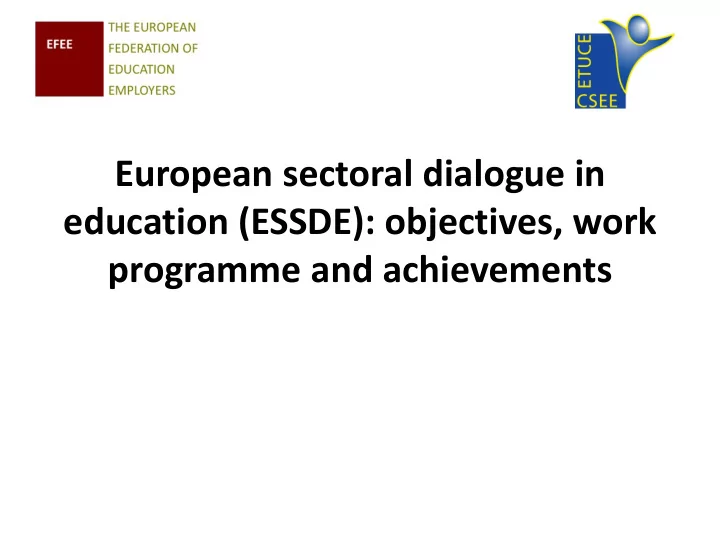

European sectoral dialogue in education (ESSDE): objectives, work programme and achievements
Development of ESSDE • ETUCE established in 1977, representing 131 teacher unions in 48 countries • EFEE established in 2009, representing 31 organisations in 16 countries • ESSDE was launched in 2010 under Articles 154-155 of the EU Treaty.
Aims and objectives of ESSDE • Contribute to the improvement of the quality of education in Europe thereby focusing on the modernisation of the education sector, its managements and its teaching personnel. • Focus our joint work on topics that have sufficient common ground for discussion and for initiatives with a clear added value for cooperation at European level. • Advising the European Commission on initiatives relating to education and social policy.
Organisation of ESSDE Working Groups • 2 Working Groups + 1 Plenary meeting p/y • Themes of the ESSDE work programme • Specific Working Group for HE&R Projects • To study a topic more in depth, focused on peer learning among ETUCE/EFEE members • Prepare Joint ESSDE Outcomes, such as Joint Declarations, Guidelines, Toolkits, Recommendations etc.
Work Programme 2016-2017: topics • Cooperation with DG EAC • Public/private developments in education • Paris Declaration and facilitating integration • Open and innovative education and training • Supporting teachers, trainers and school leaders • Making the teaching profession more attractive • Vocational education and training and Apprenticeships • Higher Education and Research • High quality skills and competences • Promotion of Social Dialogue • Evaluation of ESSDE outcomes • Communication Strategy
Work Programme: Projects (I) • Promoting Decent Workplaces in the Education Sector for a Healthier Working Life (2015-2016) • Outcomes: – Joint report with results from survey + case study visits (BE, FI, DE, ROE) – Joint Practical Guidelines & Joint Declaration on Preventing and combating psychosocial hazards in education – Cooperation with EU-OSHA on risk assessment tool
Work Programme: Projects (II) • European Sectoral Social Partners in Education promoting the potentials of their dialogue through knowledge transfer and training (2015-2016) – Joint Statement on Promoting the potentials of ESSDE • European Sectoral Social Partners in Education striving for sustainable influence on European education policy building through successful social dialogue (2017-2018)
Examples outcomes work programme 2010-2015 (I) Recruitment & Retention • Project & Joint Recommendations on recruitment and retention in the education sector Self-evaluation • Project & Joint Declaration on self-evaluation of schools and teachers School Leadership • Two projects on Leadership and Governance & Professional autonomy, accountability and efficient leadership & Joint Declaration on School Leadership Higher Education & Research • Project & Joint Declaration on supporting early career researchers in higher education in Europe
Examples outcomes work programme 2010-2015 (II) Joint replies: • Joint position on the contribution of sectoral social dialogue to the strengthening of social dialogue (2015) • Joint Statement on Professional Qualifications Directive (2012) • Joint Declaration on Investment in Education (2011)
Concluding Comments • Engagement with trade unions under ESSDE broadens the perspective of both sides – joint ownership of issues • Debates and discussions are stimulating and informative. Agreement on final text of documents requires foresight and understanding of different perspectives driven by different needs • Employer/Union engagement in ESSDE at European level creates positive effect on similar national debates • Most often issues and concerns in home country are same as issues and concerns at European level • We are all on the one road!
For further information, please have a look at our websites: - EFEE: www.educationemployers.eu - ETUCE: www.csee-etuce.org - European Commission: http://ec.europa.eu/social/main.jsp?catId=480&langId=en&intPage Id=1822
Recommend
More recommend